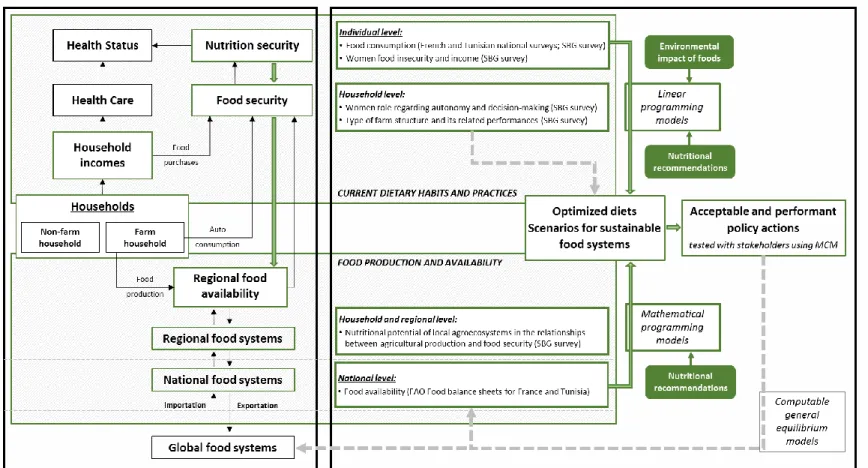HAL Id: hal-02785378
https://hal.inrae.fr/hal-02785378
Submitted on 4 Jun 2020
HAL is a multi-disciplinary open access
archive for the deposit and dissemination of sci-entific research documents, whether they are pub-lished or not. The documents may come from teaching and research institutions in France or abroad, or from public or private research centers.
L’archive ouverte pluridisciplinaire HAL, est destinée au dépôt et à la diffusion de documents scientifiques de niveau recherche, publiés ou non, émanant des établissements d’enseignement et de recherche français ou étrangers, des laboratoires publics ou privés.
Promoting sustainable food systems for good nutrition
and health in the Mediterranean region: a conceptual
framework from the MEDINA-Study Group
Eric Verger, Marlène Perignon, Marie Josephe Amiot-Carlin, . Medina Study
Group
To cite this version:
Eric Verger, Marlène Perignon, Marie Josephe Amiot-Carlin, . Medina Study Group. Promoting sustainable food systems for good nutrition and health in the Mediterranean region: a conceptual framework from the MEDINA-Study Group. 21. International Congress of Nutrition (ICN), Oct 2017, Buenos Aires, Argentina. 1 p., 2017. �hal-02785378�
Background and Objectives:
Methods:
Results:
Conclusions:
Authors: Affiliation:Eric O Vergera, Marlene Perignonb, Marie-Josephe Amiotband the MEDINA-Study Group.
• A fork-to-farm and multi-scale approach starting from the current dietary habits and practices to identify the dietary changes needed to ensure food and nutrition security while examining the way it affects the food production and availability (Fig. 1).
• Conceptual framework and methodologies were developed for rethinking food systems in the Mediterranean region to sustain consumption and production.
Reference
Keywords:Food systems; Sustainability; Mediterranean region; Conceptual framework
Title:
Promoting sustainable food systems for good nutrition and
health in the Mediterranean region: a conceptual framework
from the MEDINA-Study Group
Further Collaborators: The MEDINA-Study Group includes N Achir (CIRAD), L Alouane (INNTA) J El Ati (INNTA), S Bellagha (INAT), PM Bosc (CIRAD), M Broin (Agropolis), N Darmon (INRA), C Dhuique-Meyer (CIRAD), MC Dop (IRD), S Drogué (INRA), S Dury (CIRAD), A Ferchoui (INRA), Gaillard C (CIRAD), Z Ghrabi (INAT), F Jacquet (INRA), Y Kameli (IRD), F Kefi (CIHEAM), E Kesse-Guyot (INRA), D Lairon (INSERM), Y Martin-Prevel (IRD), C Méjean (INRA), C Mouquet (IRD), S Njoumi (INAT), M Padilla (CIHEAM), C Sinfort (SupAgro), P Traissac (IRD).
Fig. 1. The left side represents partially the impact pathways between the food systems and the nutrition and health, with the classic farm-to-fork approach (black arrows) and the fork-to-farm approach (green arrows). The right side represents the modeling approach used to propose guidelines ensuring good nutrition and sustainability, with models currently applied in the MEDINA research project (green arrows and boxes), as well as the models considered as perspectives (grey arrows and boxes). SBG, Sidi Bouzid Governorate. MCM, Multi-Criteria Mapping.
Fundings and Conflict of Interest : This work was supported by the “Agence Nationale de la Recherche” as part of the MEDINA research project “Promoting sustainable food systems in the Mediterranean for good nutrition and health” (ANR-12-TMED-0004-01), INNTA and Bioversity International. No conflict of interest to declare.
144/731
aNUTRIPASS, IRD, Université Montpellier, SupAgro, Montpellier ; bJoint Research Unit 1110 Markets, Organizations, Institutions
and Stakeholders Strategies (MOISA), INRA, CIRAD, CIHEAM, SupAgro, Montpellier, France.
• Gathering of multidisciplinary expertise in nutrition, food sciences, epidemiology, biostatistics, agronomy, environmental science and economics.
• Identification of relevant parameters to be included in a conceptual framework studying the sustainability of food systems in South of France and Centre of Tunisia.
• The framework includes the following parameters: adherence to the Mediterranean diet pyramid, nutritional potential of local agro-ecosystems, environmental impacts of the food systems, and food trade and dependence on food imports.
• We also identified perspectives to implement this framework (exposure to contaminants, nutrient bioavailability) in order to contribute designing ambitious agricultural, food and health policies and prioritizing actions. • Countries of the Mediterranean region are undergoing different stages of nutritional transition affecting the health of inhabitants: risk of
inadequate intakes of nutrients, risk of obesity and diet-related noncommunicable diseases.
• Concurrently, the Mediterranean region is facing a massive alteration of its environment (e.g. water scarcity, soil erosion and biodiversity loss) threatening the local food system capacities to ensure food security and nutritional adequacy.
• Our objective is to propose policy actions to promote sustainable food systems ensuring good health and nutrition in the Mediterranean region while mitigating environmental impact and promoting traditional foods and cultural heritage.
• Specific survey on food intakes in women and a budget survey on smallholder farm households living in the governorate of Sidi Bouzid in Tunisia were performed to both understand the current dietary habits and practices, and the food production and availability (individual, household and regional level). Existing food consumption surveys (individual level) and FAO’s food availabilities data (national level) were also used for France and Tunisia.
• Linear programming models based on existing food consumption surveys were used to design optimized diets (individual level) fulfilling nutritional recommendations while minimizing environmental impacts (water deprivation, land use effects and biodiversity). Another mathematical programming model was used to optimize the food availabilities with regard to nutrient requirements (national level).
• Optimized diets and scenarios for sustainable food systems were obtained to design policy actions. A participatory approach was used to ensure their efficiency by involving key stakeholders. Of note, we explored the views of key stakeholders on the overall performance of pre-defined policy actions by using a multi-criteria mapping technique based around a computer program called ‘Multi-Criteria Mapper’.
